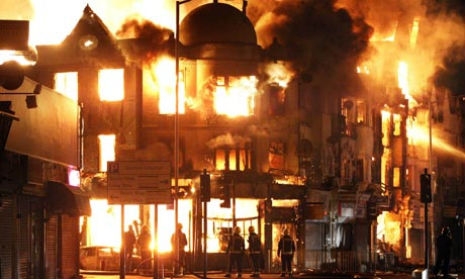
On an individual basis, when you are staring one dumb kid in the face who can’t articulate why he wanted to burn a local shop to the ground, well then, yes, you can say it’s criminal behavior, someone who wasn’t raised properly or a matter of law and order. However, when mass-rioting is seen on a scale the likes of which occurred in England recently, it seems quite obvious that what we’re observing is a widespread social pathology resulting from end-stage capitalism. From the tepid (and often counter-productive) response of the British government to the riots, one can only conclude that they have completely run out of ideas—or lack the will—to do anything about the root causes of the unrest.
Radical Marxist philosopher Slavoj Žižek writes on on the deeper meaning of England’s riots in the London Review of Books:
Repetition, according to Hegel, plays a crucial role in history: when something happens just once, it may be dismissed as an accident, something that might have been avoided if the situation had been handled differently; but when the same event repeats itself, it is a sign that a deeper historical process is unfolding. When Napoleon lost at Leipzig in 1813, it looked like bad luck; when he lost again at Waterloo, it was clear that his time was over. The same holds for the continuing financial crisis. In September 2008, it was presented by some as an anomaly that could be corrected through better regulations etc; now that signs of a repeated financial meltdown are gathering it is clear that we are dealing with a structural phenomenon.
We are told again and again that we are living through a debt crisis, and that we all have to share the burden and tighten our belts. All, that is, except the (very) rich. The idea of taxing them more is taboo: if we did, the argument runs, the rich would have no incentive to invest, fewer jobs would be created and we would all suffer. The only way to save ourselves from hard times is for the poor to get poorer and the rich to get richer. What should the poor do? What can they do?
Although the riots in the UK were triggered by the suspicious shooting of Mark Duggan, everyone agrees that they express a deeper unease – but of what kind? As with the car burnings in the Paris banlieues in 2005, the UK rioters had no message to deliver. (There is a clear contrast with the massive student demonstrations in November 2010, which also turned to violence. The students were making clear that they rejected the proposed reforms to higher education.) This is why it is difficult to conceive of the UK rioters in Marxist terms, as an instance of the emergence of the revolutionary subject; they fit much better the Hegelian notion of the ‘rabble’, those outside organised social space, who can express their discontent only through ‘irrational’ outbursts of destructive violence – what Hegel called ‘abstract negativity’.
There is an old story about a worker suspected of stealing: every evening, as he leaves the factory, the wheelbarrow he pushes in front of him is carefully inspected. The guards find nothing; it is always empty. Finally, the penny drops: what the worker is stealing are the wheelbarrows themselves. The guards were missing the obvious truth, just as the commentators on the riots have done. We are told that the disintegration of the Communist regimes in the early 1990s signalled the end of ideology: the time of large-scale ideological projects culminating in totalitarian catastrophe was over; we had entered a new era of rational, pragmatic politics. If the commonplace that we live in a post-ideological era is true in any sense, it can be seen in this recent outburst of violence. This was zero-degree protest, a violent action demanding nothing. In their desperate attempt to find meaning in the riots, the sociologists and editorial-writers obfuscated the enigma the riots presented.
The protesters, though underprivileged and de facto socially excluded, weren’t living on the edge of starvation. People in much worse material straits, let alone conditions of physical and ideological oppression, have been able to organise themselves into political forces with clear agendas. The fact that the rioters have no programme is therefore itself a fact to be interpreted: it tells us a great deal about our ideological-political predicament and about the kind of society we inhabit, a society which celebrates choice but in which the only available alternative to enforced democratic consensus is a blind acting out. Opposition to the system can no longer articulate itself in the form of a realistic alternative, or even as a utopian project, but can only take the shape of a meaningless outburst. What is the point of our celebrated freedom of choice when the only choice is between playing by the rules and (self-)destructive violence?
The outright dismissal by many conservative commentators in England that there was ANY political content to the actions of the (supposedly pampered) rioters seemed idiotic to me. AS IF the observation of the mass behavior of thousands upon thousands of underclass young men deciding to burn their neighborhoods to the ground provided not a scrap of data to be interpreted by social scientists? Nonsense!
The liberals in the UK don’t seem to have that much better a grasp of the situation, as Žižek goes on to point out…
Watch for the repetitions. They’re going to be hammering us harder and faster until we start to wise up…
Read the rest of “Shoplifters of the World Unite” by Slavoj Žižek (London Review of Books)
Below, Slavoj Žižek: “What does it mean to be a revolutionary today?” speech from the Marxism 2009 conference.